The final stop on our two-week trip through China with my parents was Xiamen, a city located on the southwest coast of Fujian province. Xiamen is a city, but it’s very different from other Chinese cities. First of all, because Xiamen is coastal, the air quality is supposed to be quite good (though it was still pretty hazy when we were there). Second, the Chinese government has made the buses very cheap in order to encourage public transport, so there are hardly any motorcycles or bikes on the road. And finally, Xiamen is a mere 2 km away from Jinmen, a Taiwanese island (the one that was bombed throughout the 50s and 60s by the Chinese), so there is much trade and travel between the the two countries. The people of Xiamen even speak the local Taiwanese dialect.
All of this makes Xiamen feel almost like a generic big city in Taiwan, which (in general) was not really that interesting to us…but we did do a few things of note in the city proper. We checked out a memorial to a local merchant who made his fortune in Singapore and came back to his hometown of Xiamen in order to develop the city (many towns in China were developed in this way—through the benevolence of one of it’s people).
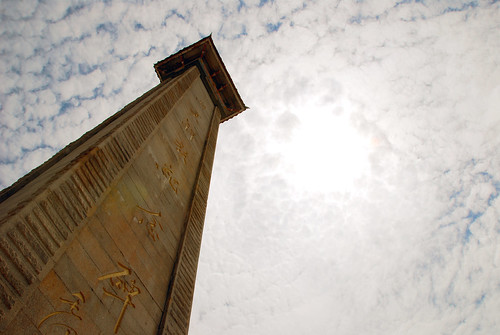
Memorial to a man who helped build universities and other public institutions in Xiamen.
And we visited the island of Gu Lang Yu, which is Xiamen’s main tourist attraction. I think all of us in the group were pretty tired at this point on the tour, so we didn’t explore too much of the island. Given more time and energy, I am sure it would have been interesting—Gu Lang Yu has an international past, with many ex-pats living on the island. Today, it is known as “Embassy Island,” with something like 100 foreign embassies squeezed onto it’s tiny body.
By far the most interesting part of our time in Xiamen was actually our visit to a place about 3 hours outside of the city, a place called Hakka House. The Hakka are an ethnic minority in the region that live in huge, communal, circular houses made out of mud, sticky rice, and stones.

View of Hakka House from above.

View of Hakka House from the inside.
Hakka houses are are built in a circular shape for protection from local bandits and animals. They are really big, but they house only one family…though “one family” can mean up to 4 generations of grandparents, parents, kids, uncles, cousins, etc. The first floor of a Hakka house is all kitchens, with storage on the second floor, and living quarters on the top floor. It can take years to build a Hakka house, since they are made of mud and sticky rice…you have to wait for the first floor to dry before building the next floor.
Though it has become a UNESCO World Heritage site, the Hakka House is still a functioning village. We saw many domestic scenes as we walked through the site:
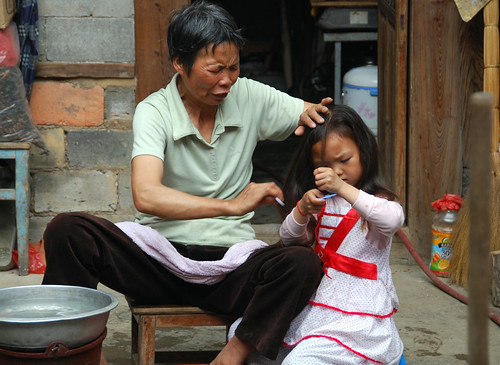
Little girl getting her hair washed by her grandmother. She was screaming and carrying on as her grandma tried to comb the tangles out of her hair.
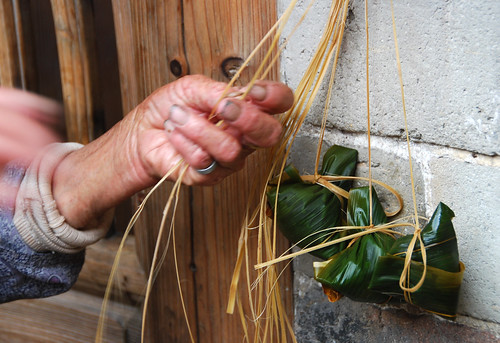
Woman with amazing hands wrapping zong zi.
Before we went to Hakka House, we stopped by a local village for lunch that was having it’s market day. We had some free time before lunch to wander around and check out all the stuff for sale: live chickens, strange vegetables, intestines hanging on meat hooks…
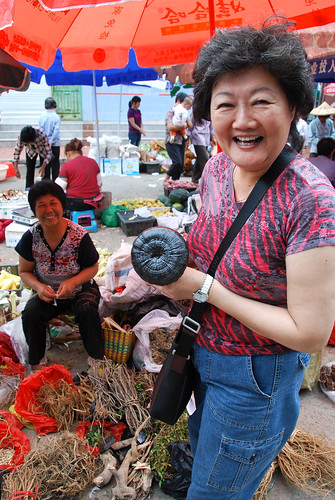
My mom with some sort of mushroom.
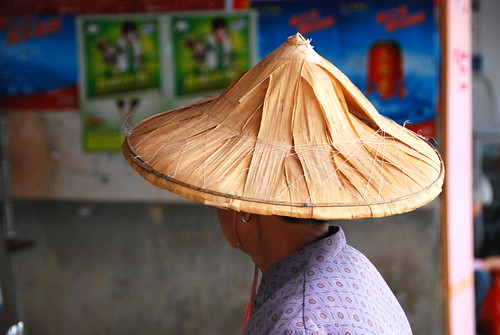
I don’t know why, but I LOVE this photo of an old lady in the market.
I really enjoyed our time at Hakka House and this local village, but our visit was far too short. Because it was a 3 hour drive from Xiamen each way, we had to hurry back for our special goodbye dinner, where we played a Xiamen dice game and ate something called “sea worm.” I have to admit, it was fun to do this eating tour with Frank, but I am not sure how much more crazy stuff we could have eaten!
In Xiamen, we said goodbye to my parents as we prepared to head our separate ways (us to Yangshuo, and my parents back to Taiwan via Jinmen). We had an incredible time traveling together with Eddo as a family, and it was truly a special experience to be with my mom on her first visit to China and with my Dad on his first visit back to Taiwan in 26 years. I feel that through this trip, I understand so much more about my parents than I did before. As I told Jeremy, “In the US, I feel like my parents are so Chinese. In Taiwan, I felt like they were Americans, and in China, I feel like they are Taiwanese!” The truth is, they are all three of those things, as am I, as is my brother. I see my parents in a new light now…I never thought of them as “international” before, but traveling through Asia with them, I see that they really are the embodiment of that word. I learned so much more about my heritage and I understand more deeply my responsibility to transmit the lessons I’ve learned from my parents and my grandparents to the next generation.
In an email, my parents described this leg of our journey as “the trip of a lifetime.” Indeed, it was a trip of many lifetimes, and of many lives convening to lead us to this place, together, as a family. Thank you, Mommy, Daddy, and Eddo for coming out to travel with us, sharing your stories, and discovering this land that is both familiar and unfamiliar to us all. We will treasure this time together for many more lifetimes to come.
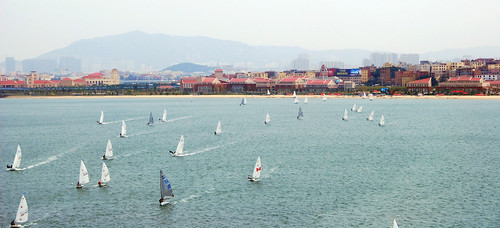
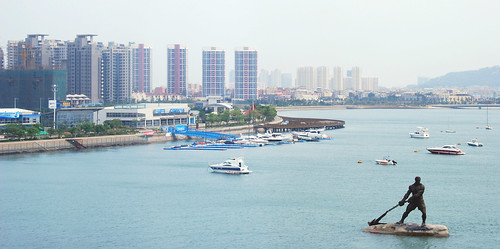
Hakka House looks pretty amazing and I would love to go there someday. I think somewhere in my family we have some Hakka blood mixed in, so it’d be very cultural.
I also really love the reflection on traveling with your family. I must say, I’m actually really jealous that you were able to do that together! I’m pretty sure that I would feel the same about my parents, even though my dad was born in New York. But really, you are so lucky to have been able to travel together as a family, especially because families are always harder to get together when the kids get older. Looking forward to reading more of your travels!!
It’s a unforgetable experience for us too, Hope & Jeremy. It touches me deeply when you feel the conncetion to your anacester or the old lady in a straw hat, you’ve openned your heart to accept more differences of people and culture, I guess this is the essence of your world travel experience. How funny you can see that we felt like a American in Taiwan, a Taiwanese in China, a Chinese in America. I couldn’t imagine how confused you were, growing up in US, look like Asian, brought up like a Chinese, but expected to succeed like an America. I salute you kids,
it sure was not easy. We are proud of you.